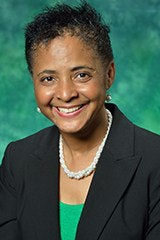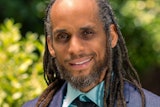“Wow!” That was Deken Taylor’s reaction when I showed him 20 Cedis from Ghana. Taylor, a University of North Texas public relations student from Pittsburg, Texas, had never seen money featuring six Black men.
 Dorothy Bland
Dorothy BlandJust as the images of U.S. presidents on U.S. currency, the six men on the 20 Cedis are history makers and famous in Ghana for being leaders of the United Gold Coast Convention (UGCC).
The six men – Ebenezer Ako Adjei, Edward Akufo-Addo, Joseph Kwame Kyeretwie Boakye Danquah, Kwame Nkrumah, Emmanuel Odarwei Obsetsebi-Lamptey and William Ofori Atta – are founding fathers of the nation that gained its independence from British rule in 1957. The bank note was just one of the souvenirs I used as a teaching tool with some UNT students after giving three guest lectures about mobile/social media trends, digital disruption in media and gender disparities in media at the University of Ghana in March.
I realized there is much opportunity to educate our students and others about study abroad options on the African continent after a colleague asked what language was spoken at the University of Ghana, the largest university in West Africa with nearly 45,000 students. My reply: English.
He also asked if the men were separated from the women in classes. My response: No. And based on research and various advertising billboards, religion is big in Ghana.
Djuana Young, an associate vice president for enrollment at Texas Wesleyan University, first visited Ghana in 1990 as a student and returned this spring with her daughter, Avery, for a mother-daughter vacation.
Young said the Ghanaian “people live, work, and have the same goals and desires” that Americans do. “Parents want their child to be successful,” she said.
Audrey Gadzekpo, a University of Ghana professor, said women outnumber men in the master’s and Ph.D. program in the Department of Communication Studies. The university attracts students from more than 70 nations or territories.
For those who work in international education programs, it comes as no surprise that there is much work to do in diversifying international programs in higher education.
Most outbound study abroad students from the U.S. are likely to be White and female. According to a 2018 Diversity Abroad report, “professionals in international education mirror the present demographic profile of students in education abroad in the United States.”
About 71 percent of the survey respondents were White and 29 percent were people of color. No survey respondents identified as Native American. Women represented about 79 percent of the respondents, followed by men at 20 percent and about 0.2 percent identified as transgender.
Adam Freed, a university relations manager with CISabroad, offered the following counsel in a 2018 Diversity Abroad blog post: “First, we need to elevate diverse professionals in the field and provide them opportunities to share their knowledge and unique perspective. Secondly, we need to hire diverse staff to fill our study abroad offices at all levels.”
It is a blessing that folks like Marquita Smith, a John Brown University professor and Fulbright scholar, as well as UNT colleagues with Ghanaian roots such as Gideon Alorwoyie, a music professor and world-class drummer, Charles Blankson, a business professor, and Joseph Oppong, a geography professor and associate dean of the UNT Toulouse Graduate School, shared their expertise and experiences.
Thanks in part to a UNT International grant, my March mission was to explore options for a study abroad program with students in 2020 and future research collaborations. It was a professional development treat as the Ghanaian government is promoting “Year of Return, Ghana 2019.”
The celebration marks the 400th anniversary of slave ships from the coast of West Africa arriving in Virginia. It also coincides with the biennial Pan African Historical Theatre Festival, which is scheduled for July 25-31. Read more about the festival here.
Although I will not make that festival, I recommend touring at least four sites: the W.E.B. Du Bois Centre in Accra, Kakum National Park, the Cape Coast and Elmina Castles.
Du Bois is cited for being the first Black to earn a doctorate from Harvard, a historian, sociologist, Pan-Africanist, author of The Souls of Black Folk and one of the founders of the National Association for the Advancement of Colored People. His wife, Shirley Graham DuBois, was a founding director of the Ghana Broadcasting Corporation in addition to being an author, playwright, composer and social/political activist.
Tours to Kakum National Park, the Cape Coast and Elmina Castles are day trips from Accra. Tour guides shared that each castle had a “door of no return” as thousands of slaves passed through dungeons before they were shipped to the Americas during the transatlantic slave trade era from the 16th to 19th centuries.
At Cape Coast Castle, the “door of no return” has been updated and labeled the “door of return,” to encourage descendants of the African Diaspora to visit and learn more about their African roots. The castles have become museums, tourist attractions and world heritage sites under the United Nations Educational Scientific and Cultural Organization (UNESCO).
Besides experiencing lots of history, culture, food, music and adventure, part of the joy in travel is the people you meet. The “spring break” adventure was Young’s first mother-daughter trip to Ghana. “I wanted her to see and understand what a strong people we come from,” said Young. “We have what it takes to persevere and make it.”
Dorothy Bland is a journalism professor at the University of North Texas. She has traveled to 30 nations and written articles from six continents.















